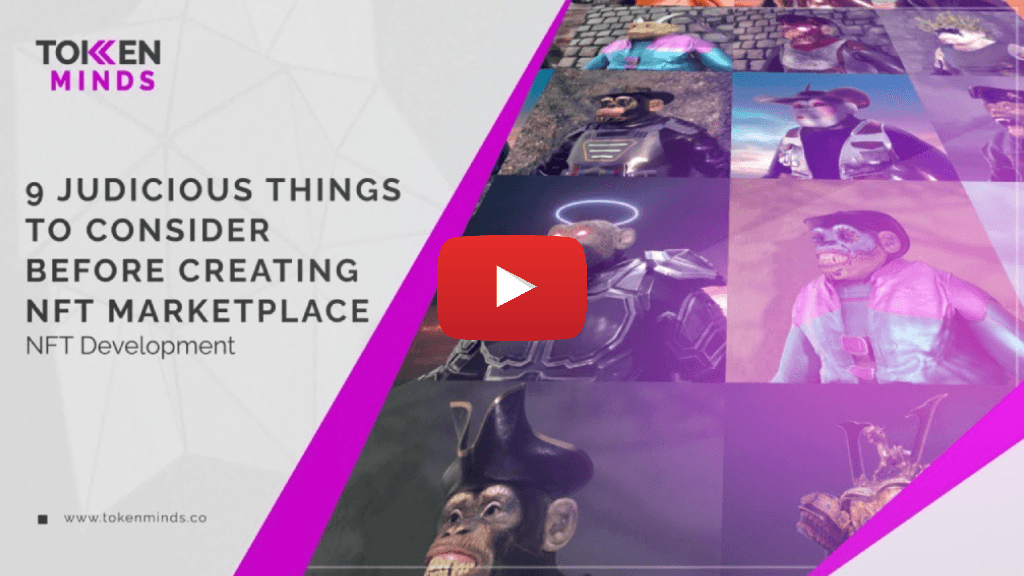9 Judicious Things to Consider Before Creating NFT Marketplace – NFT Development

Video Transcript:
Rob: Nft marketplace development companies, nine things to consider before creating your nft marketplace. I have with me here Josh our lead development manager. Hey Josh.
Josh: Hi Rob, thanks for having me here.
Rob: Thank you for joining appreciate it. Let’s start first with what is an nft marketplace and how does it function?
Josh: So an nft marketplace is a blockchain-based digital platform that facilitates the storing, displaying, and trading of NFTs. It has become popular because also with the popularity increase of non-fungible tokens or NFTs. Primary functionalities include at least four. The first one is authentication where the end user can sign up using their web3 wallet, second is the ability to mint and list their nfts for sale. The third is selling nfts, and the fourth is being able to gift or transfer their nfts.
Rob: And what are the main points you consider when developing your nft marketplace?
Josh: Okay so there are key points to consider in developing your nft marketplace. The first one is choosing a particular niche. Since there are already a lot of third-party nft marketplaces, this day it’s a good strategy to find a target niche to differentiate yourself from other competitors. The second one is determining the blockchain to use. Since there are a variety of blockchains available to choose from, either it is on Ethereum, polygon, or Solana, and it can also be a multi-chain marketplace wherein anyone who is selling nfts on either of these three popular blockchains can use the platforms. The third one is being able to decide on the features. As mentioned there are four important functionalities in the marketplace. However you can also opt to decide on other features, like being able to have a digital nft storefront, wherein users can see recently listed nfts, filters wherein users can use these filters to find specific nft, depending on tags or artists. Third, is having like a crypto nft storage app that they can store or view the nfts that they purchase or they’re willing to sell. Fourth is nft listing, this feature allows the nft owner to list their nfts for sale.
Next is a payment code, so there are a lot of payment modes for nft marketplaces, you can either pay in Ethereum, Matic, or Solana, but recently there’s rising popularity in integrating web2 payments as well to make it easier for non-web3 users to buy nfts, and lastly the ability to buy or auction your nft, this allows your users to have more flexibility in terms of selling their nfts. Some doesn’t want to sell their nfts straight up but instead they want more of an auction style of selling. The fourth key point to consider is keeping decentralization. So easily by choosing a popular blockchain network, you can make sure that your marketplace is decentralized, and lastly about monetization. So since you’re building a platform you need a way to monetize this platform, and this will be the way nft marketplace monetizes through transaction fees. These fees are added for every transaction like selling, auctioning of nfts or transferring nfts.
Rob: All right, what would you take into account when hiring an nft marketplace development company?
Josh: Hiring an experienced nft marketplace development company these days is quite tricky. The main reason is there are a lot of agencies or development teams that are popping up. However, I can give a few tips on how they can identify if a team or a company has a good or experienced nft marketplace development company. The first one would be a good track record, you need to research if this particular company has a good track record of delivering products on time, and are their customers satisfied with what they have achieved in the past. The second is experience, experience in blockchain in particular. Are these developers or does this company have experience in building smart contracts, tokens, or anything related to the blockchain, since an NFT marketplace is technically a back end or a smart contract?
In general, it is a good thing if a certain nft marketplace development company has the experience in building these smart contracts prior to having or leading their customer. The third is knowledge of how the marketplace works. So they should have the knowledge of standard ways of building marketplaces, and how marketplaces work, like OpenSea and rarible, being able to have a marketplace that is easily integrated into these popular nft marketplaces is very important because some users would love to have their nfts minted on your platform but also have the ability to be integrated with these bigger nft marketplaces which are more popular. And availability, so what you mean by availability is the time you need developers. Are you looking for a part-time development team, a full-time development team, or even a project-based one?
The fifth is budget, so since this is a project you need to know exactly what you need to build because that directly affects the budget, in terms of development. It actually depends on the type of nft marketplace development you need, and lastly smart contracts. As mentioned a while ago, the nft marketplace is built on smart contracts. So it is very important that an experienced nft marketplace development company have a good understanding of how smart contract works. Overall there are a lot of things that you need to consider in building an nft marketplace, but hopefully, what I shared with you this day, you can use in finding a good and experienced marketplace development company.
Rob: thank you so much guys, appreciate it, and see you all next time. Bye.
